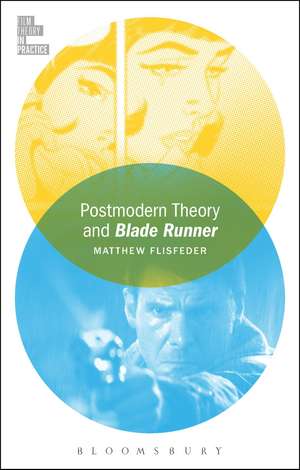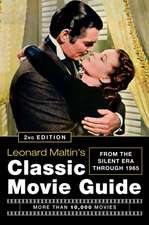Postmodern Theory and Blade Runner: Film Theory in Practice
Autor Matthew Flisfederen Limba Engleză Paperback – 5 apr 2017
| Toate formatele și edițiile | Preț | Express |
|---|---|---|
| Paperback (1) | 131.38 lei 6-8 săpt. | +38.69 lei 7-11 zile |
| Bloomsbury Publishing – 5 apr 2017 | 131.38 lei 6-8 săpt. | +38.69 lei 7-11 zile |
| Hardback (1) | 463.85 lei 6-8 săpt. | |
| Bloomsbury Publishing – 5 apr 2017 | 463.85 lei 6-8 săpt. |
Preț: 131.38 lei
Preț vechi: 162.21 lei
-19% Nou
Puncte Express: 197
Preț estimativ în valută:
25.14€ • 26.34$ • 20.84£
25.14€ • 26.34$ • 20.84£
Carte tipărită la comandă
Livrare economică 08-22 aprilie
Livrare express 04-08 martie pentru 48.68 lei
Preluare comenzi: 021 569.72.76
Specificații
ISBN-13: 9781501311796
ISBN-10: 1501311794
Pagini: 184
Dimensiuni: 129 x 198 x 32 mm
Greutate: 0.2 kg
Editura: Bloomsbury Publishing
Colecția Bloomsbury Academic
Seria Film Theory in Practice
Locul publicării:New York, United States
ISBN-10: 1501311794
Pagini: 184
Dimensiuni: 129 x 198 x 32 mm
Greutate: 0.2 kg
Editura: Bloomsbury Publishing
Colecția Bloomsbury Academic
Seria Film Theory in Practice
Locul publicării:New York, United States
Caracteristici
Offers an original interpretation of Ridley Scott's Blade Runner, including expanding the filmic text to include a variety of iterations (the Director's Cut and Final Cut) and viewing formats and conditions
Notă biografică
Matthew Flisfeder is an Assistant Professor in the Department of Rhetoric, Writing, and Communications at the University of Winnipeg. He is the author of The Symbolic, The Sublime, and Slavoj Zizek's Theory of Film (2012) and co-editor of Zizek and Media Studies: A Reader (2014).
Cuprins
AcknowledgementsIntroductionChapter One: Postmodernism and Postmodern TheoryChapter Two: Postmodernism and Blade RunnerConclusion: Postmodern Theory After The End Of HistoryFurther Reading
Recenzii
This book not only offers a thorough and lucid presentation of the multiple features of postmodernist theory today, it dramatizes them in a bravura reading of Blade Runner which sees the film's seven different versions as so many historically distinct texts, each one constituting a modified reaction to a new and evolving socio-historical situation. Flisfeder expertly treads that narrowest of paths between description and evaluation, between theory and ideology.
Between the lines of the different versions or simulacra of Blade Runner, Flisfeder offers a succinct and compelling account of postmodernism and its theoretical underpinnings. This wonderful book is an object lesson in film analysis and critical thinking that finds within the text an explanation for society's inability to conceive of alternatives to its own dystopian and mediatised present.
Matthew Flisfeder's fast-paced and very readable book offers a knowledgeable and accessible introduction to postmodern theory. His analysis of Blade Runner not only helps unpack and illustrate his key concepts, but also gives fresh new perspectives on a modern film classic. Above all, this book foregrounds the continued relevance of postmodernism by emphasizing its usefulness as a critical and fundamentally political concept.
Between the lines of the different versions or simulacra of Blade Runner, Flisfeder offers a succinct and compelling account of postmodernism and its theoretical underpinnings. This wonderful book is an object lesson in film analysis and critical thinking that finds within the text an explanation for society's inability to conceive of alternatives to its own dystopian and mediatised present.
Matthew Flisfeder's fast-paced and very readable book offers a knowledgeable and accessible introduction to postmodern theory. His analysis of Blade Runner not only helps unpack and illustrate his key concepts, but also gives fresh new perspectives on a modern film classic. Above all, this book foregrounds the continued relevance of postmodernism by emphasizing its usefulness as a critical and fundamentally political concept.























